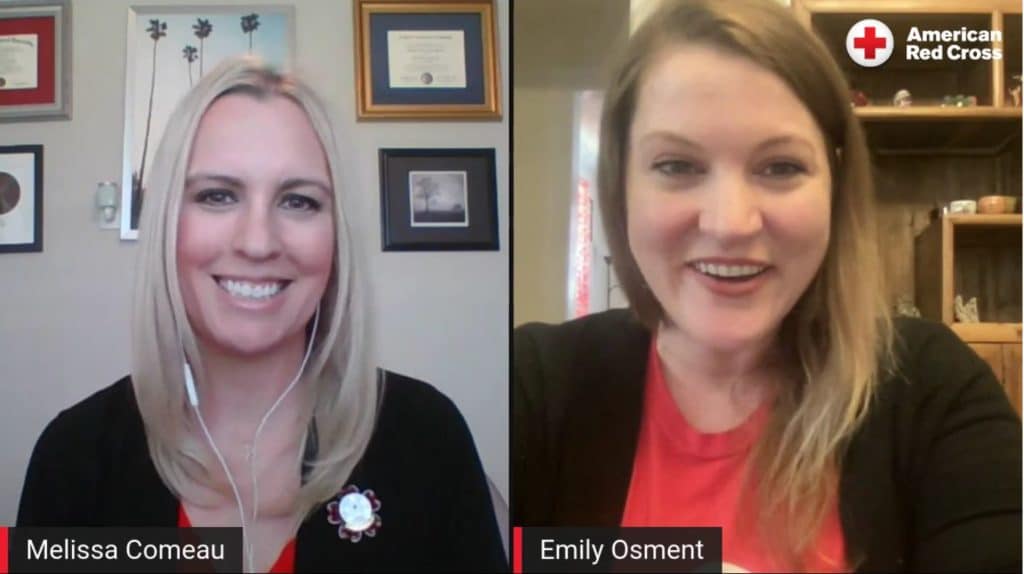
More than one in five Americans care for someone who is injured, ailing or aging. They are caregivers and might not even know it. In a recent Facebook and LinkedIn Live, Emily Osment, Red Cross senior media manager, sat down with Melissa Comeau, Red Cross Director of the Military & Veteran Caregiver Network, for a live discussion to debunk the common myths about caregiving and provide tips and resources for those caring for injured or wounded service members and veterans.
Myth #1: Caregivers are nurses.
“The caregivers that we’re talking about are not professionals. These are friends, family members, neighbors, maybe even battle buddies that served with you, who are providing care to a wounded, ill, injured, aging service member. There are lots of different types of caregivers that work in the professional realm; home health aides, professional caregivers, nurses, of course, but this is a little bit different. We’re talking about family members and friends. In the military space there are five and a half million military and veteran caregivers, and these people are caring for our wounded, ill and injured.”
Myth #2: It’s obvious when you’re a caregiver.
“My husband deployed both to Iraq and Afghanistan. He has a total of four combat deployments. It was after his fourth combat deployment that we really noticed some of the injuries that he was facing. It was determined that he would need to go to the Wounded Warrior Battalion at Camp Pendleton and really focus on his rehab and recovery. In the midst of it all, I didn’t know I was a caregiver.
I’m going to these medical appointments. I’m on base regularly. I’m talking to doctors and learning about medications and treatments. It wasn’t until I was sitting outside of his scan or a test when a nurse came out and asked me, “Are you Steven’s caregiver?” And I was like, “No, no, no, no, no. My husband’s young. I’m just his wife. I’m just his wife.” She smiled kindly and just said, “You’re probably both.”
Myth #3: You must be physically wounded and/or aging to receive care.
“False. There are a variety of different injuries. In caregiving we tend to talk a lot about activities of daily living; showering, feeding, transferring, that all tend to lean towards physical needs. My husband has what they call the invisible wounds of war; traumatic brain injury, post-traumatic stress disorder, and you wouldn’t necessarily know by looking at him that he’s faced any of those challenges. Traumatic brain injury can go anywhere from mild to severe. They can be cumulative. We’ve learned a lot from military medicine about the brain, especially in IED, blast exposure type brain injuries.”
Myth #4: If you’re a caregiver, that’s all you are.
“Many caregivers are full-time employees, mothers, teachers, they are students, they are colleagues, they are members of your community, so you are never just a caregiver. I really hope caregivers can latch on and know that you are doing some caregiving tasks, but you are always more than just a caregiver. I’m going to tell caregivers. I know you hear that all the time respite, self-care is so important, but that’s really how you find your way out of that intense caregiving. It’s not always appropriate. There is not always time. I mean, there are very acute stages of caregiving where you might be doing it around the clock. You’re not sleeping. You’re not eating. It’s very intense. And to anyone who’s doing that right now, my heart goes out to you. I hope that you’ll engage in opportunities to step out of that role and nourish yourself, whether that’s book clubs or peer support groups or archery, anything that makes you feel good and brings you back to who you are. I really encourage caregivers to do that.”
Myth # 5: You’re on your own as a caregiver.
“We started this saying that one in five Americans are caregivers and there are five and a half million military caregivers, so you’re most definitely not alone. The key here is to find that network, find those groups, connect with people with a similar lived journey. It really can help you not feel so alone, not feel so isolated. When you start talking to others who have gone through things you’ve gone through or are sharing about a journey you might’ve also been on, it is really important to know you are not alone. We’re better together. That’s what the Military and Veteran Caregiver Network is all about.”
If you missed the recent conversation about caregivers and resources available, you can still watch the full chat on Facebook or LinkedIn.
